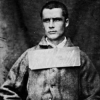John Boyle O'Reilly

John Boyle O'Reilly
John Boyle O'Reillywas an Irish-born poet, journalist and fiction writer. As a youth in Ireland, he was a member of the Irish Republican Brotherhood, or Fenians, for which he was transported to Western Australia. After escaping to the United States, he became a prominent spokesperson for the Irish community and culture, through his editorship of the Boston newspaper The Pilot, his prolific writing, and his lecture tours...
NationalityIrish
ProfessionPoet
Date of Birth28 June 1844
CountryIreland
In 1889, I predict, the legislative stage of the Irish question will have arrived; and the union with England, which shall then have cursed Ireland for nine tenths of a century, will be repealed.
Every boy in a free country ought to be instructed in boxing, wrestling, and the use of weapons. Every young man ought to be drilled. Every householder ought, at least, to have a right to own a rifle, and should know how to make cartridges.
Women ought to be fully guarded by law in all rights of property, labor, profession, etc.; but, roughly stated, the voting population ought to represent the fighting population.
No writer for the press, however humble, is free from the burden of keeping his purpose high and his integrity white.
Women are at once the guardians and the well-spring of the world's faith, morality, and tenderness; and if ever they are degraded to a commonplace level with men, this fine essential quality will be impaired, and their weakness will have to beg and follow where now it guides and controls.
A good boxer, in striking the round blow, instead of loosening body and arm, gathers himself into a heap of muscularity and begins his blow where all blows ought to begin, from the solidarity of the right foot.
With the advent of chivalry, the art of boxing waned. The evolution of feudal aristocracy, with other and widely different exercises, pastimes and weapons from those of the common people, made boxing unfashionable.
The brutalities of a fight with bare hands, the crushed nasal bones, maimed lips, and other disfigurements, which call for the utter abolition of boxing in the interests of humanity, at once disappear when the contestants cover their hands with large, soft-leather gloves.
It has always been the aim of royalty and aristocracy to lower the individual liberty and independence of the common people. A baron and a minute-man could not breathe the same air.
The success of the suffrage movement would injure women spiritually and intellectually, for they would be assuming a burden though they knew themselves unable to bear it. It is the sediment, not the wave, of a sex. It is the antithesis of that highest and sweetest mystery - conviction by submission, and conquest by sacrifice.
Social equity is based on justice; politics change on the opinion of the time. The black man's skin will be a mark of social inferiority so long as white men are conceited, ignorant, unjust, and prejudiced. You cannot legislate these qualities out of the white - you must steal them out by teaching, illustration, and example.
With the advance of feudalism came the growth of iron armor, until, at last, a fighting-man resembled an armadillo.
All that is worth seeing in good boxing can best be witnessed in a contest with soft gloves. Every value is called out: quickness, force, precision, foresight, readiness, pluck, and endurance. With these, the rowdy and 'rough' are not satisfied.
Prize-Fighting is not the aim of boxing. This noble exercise ought not to be judged by the dishonesty or the low lives of too many of its professional followers. Let it stand alone, an athletic practice, on the same footing as boating or football.